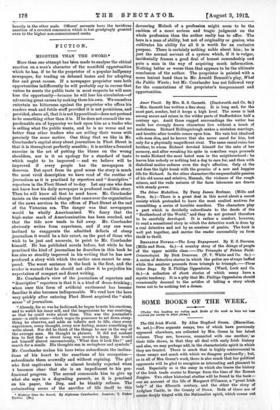FICTION.
MIGHTIER THAN THE SWORD.•
More than one attempt has been made to analyse the ethical reaction on a man's character of the manifold opportunities which he has, if he be the proprietor of a popular halfpenny newspaper, for trading on debased tastes and for adopting fine and great causes. If a newspaper proprietor uses both opportunities indifferently he will probably say in excuse that unless he meets the public taste in most respects he will soon lose the opportunity—because he will lose his circulation—of advancing great causes by making them his own. We ourselves entertain no bitterness against the proprietor who offers his
readers weak and futile stuff provided it is not pernicious, and provided, above all, that it is not hypocritical—does not pretend to be something other than it is. If he does not commit the un- pardonable sin of hypocrisy we look upon him as a trader who is selling what the public wants, and he is no worse and no better than other traders who are selling their wares with precisely the same motive. One thing that we like in Mr. Courlander's capital story about journalism in Fleet Street is that it is throughout perfectly sensible ; it is neither a frenzied exercise in the art of putting the blame on the wrong shoulders, nor is it an apology for a standard of taste which ought to be improved — and we believe will be improved if every people has the newspapers it deserves. But apart from its good sense the story is much the most vivid description we have read of the routine of journalism as it is practised by reporters and " descriptive " reporters in the Fleet Street of to-day. Let any one who does not know how his daily newspaper is produced read this story.
Then he will know all that he need know. Mr. Courlander insists on the essential change that came over the organization of the news services in the offices of Fleet Street at the end of the Victorian era. The danger was that newspapers would be wholly Americanised. We fancy that the high-water mark of Americanization has been reached, and that the tide now tends to fall away. Mr. Courlander obviously writes from experience, and if any one were inclined to exaggerate the admitted defects of cheap journalism it would be a fair retort, on the part of those who wish to be just and accurate, to point to Mr. Courlander himself. He has published novels before, but while he has practised the kind of journalism he describes in this book he has also so steadily improved in his writing that he has now
produced a story with which the earlier ones cannot be com- pared. The worst sentence in the book is the first, and the reader is warned that he should not allow it to prejudice his expectation of compact and direct writing.
Mr. Courlander's view of the journalism of reporters and "descriptive" reporters is that it is a kind of dram-drinking ; when once this form of artificial excitement has become familiar it also becomes indispensable. We read how the hero very quickly after entering Fleet Street acquired the " sixth sense " of journalism.
"Already, for so was he fashioned, he began to note his emotions, and to watch his inner self, and the impressions he was receiving, so that he could write about them. This was the journalist's sense—a sixth sense—which urges its possessor to set down every- thing he observes, and adds an infinite zest to life, since every experience, every thought, every new feeling, means something to write about. Nor did he think of the things he saw in the way of the average man. He thought in phrases. It did not content him to feel that a street lamp was merely a lamp. He would ask himself almost unconsciously, What does it look like ? ' and search for a simile. His thoughts ran in metaphors and symbols."
Mr. Courlander makes his hero twice subordinate the inclina- tions of his heart to the exactions of his occupation— subordinate them avowedly and without repining. The girl who first captivates him is almost brutally rejected when t becomes clear that she is an impediment to his pro- fessional progress. The second commands him to give up what she says is a degrading pursuit, as it is practised on his paper, the Day, and he blankly refuses. The culminating scene of the sacrifice of life itself to this
• Mightier than the Sword. By Alphonse Courlander. London: T. Fisher Unwire. [66.3
devouring Moloch of a profession might seem to be the emblem of a more serious and tragic judgment on the whole profession than the author really has to offer. The hero is a man of ability, but not of originality or genius, who cultivates his ability for all it is worth for an exclusive purpose. There is certainly nothing noble about him; he is just the normal servant of a system which, if it is vulgar, incidentally frames a good deal of honest comradeship and puts a man in the way of acquiring much information. Nothing better or worse than that appears to be the ultimate conclusion of the author. The proprietor is painted with a more lenient hand than in Mr. Arnold Bennett's play, What the Public Wants ; but Mr. Courlander has not followed very far the connotations of the proprietor's temperament and opportunities.




































 Previous page
Previous page